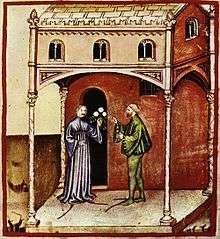Definify.com
Webster 1913 Edition
Court
Court
(kōrt)
, Noun.
1.
An inclosed space; a courtyard; an uncovered area shut in by the walls of a building, or by different building; also, a space opening from a street and nearly surrounded by houses; a blind alley.
The
courts
of the house of our God. Ps. cxxxv. 2.
And round the cool green
Of cloisters.
courts
there ran a rowOf cloisters.
Tennyson.
Goldsmith took a garret in a miserable
court
. Macaulay.
2.
The residence of a sovereign, prince, nobleman, or other dignitary; a palace.
Attends the emperor in his royal
court
. Shakespeare
This our
Shows like a riotous inn.
court
, infected with their manners,Shows like a riotous inn.
Shakespeare
3.
The collective body of persons composing the retinue of a sovereign or person high in authority; all the surroundings of a sovereign in his regal state.
My lord, there is a nobleman of the
court
at door would speak with you. Shakespeare
Love rules the
court
, the camp, the grove. Sir. W. Scott.
4.
Any formal assembling of the retinue of a sovereign;
as, to hold a
. court
The princesses held their
court
within the fortress. Macaulay.
5.
Attention directed to a person in power; conduct or address designed to gain favor; courtliness of manners; civility; compliment; flattery.
No solace could her paramour intreat
Her once to show, ne
Her once to show, ne
court
, nor dalliance. Spenser.
I went to make my
court
to the Duke and Duchess of Newcastle. Evelyn.
6.
(Law)
(a)
The hall, chamber, or place, where justice is administered.
(b)
The persons officially assembled under authority of law, at the appropriate time and place, for the administration of justice; an official assembly, legally met together for the transaction of judicial business; a judge or judges sitting for the hearing or trial of causes.
(c)
A tribunal established for the administration of justice.
(d)
The judge or judges; as distinguished from the counsel or jury, or both.
Most heartily I do beseech the
To give the judgment.
court
To give the judgment.
Shakespeare
7.
The session of a judicial assembly.
8.
Any jurisdiction, civil, military, or ecclesiastical.
9.
A place arranged for playing the game of tennis; also, one of the divisions of a tennis court.
Court
,Verb.
T.
[
imp. & p. p.
Courted
; p. pr. & vb. n.
Courting
.] 1.
To endeavor to gain the favor of by attention or flattery; to try to ingratiate one’s self with.
By one person, hovever, Portland was still assiduously
courted
. Macaulay.
2.
To endeavor to gain the affections of; to seek in marriage; to woo.
If either of you both love Katharina . . .
Leave shall you have to
Leave shall you have to
court
her at your pleasure. Shakespeare
3.
To attempt to gain; to solicit; to seek.
They might almost seem to have
courted
the crown of martyrdom. Prescott.
Guilt and misery . . .
court
privacy and solitude. De Quincey.
4.
To invite by attractions; to allure; to attract.
A well-worn pathway
To one green wicket in a privet hedge.
courted
usTo one green wicket in a privet hedge.
Tennyson.
Court
,Verb.
I.
1.
To play the lover; to woo;
as, to go
. courting
Webster 1828 Edition
Court
COURT
,Noun.
1.
A place in front of a house, inclosed by a wall or fence; in popular language, a court-yard.2.
A space inclosed by houses, broader than a street; or a space forming a kind of recess from a public street.3.
A palace; the place of residence of a king or sovereign prince.4.
The hall, chamber or place where justice is administered.St. Paul was brought into the highest court in Athens.
5.
Persons who compose the retinue or council of a king or emperor.6.
The persons or judges assembled for hearing and deciding causes, civil, criminal, military, naval or ecclesiastical; as a court of law; a court of chancery; a court martial; a court of admiralty; an ecclesiastical court; court baron; &c. Hence, 7.
Any jurisdiction, civil, military, or ecclesiastical.8.
The art of pleasing; the art of insinuation; civility; flattery; address to gain favor. Hence the phrase, to make court, to attempt to please by flattery and address.9.
In scripture, an inclosed part of the entrance into a palace or house. The tabernacle had one court; the temple, three. The first was the court of the Gentiles; the second, the court of Israel, in which the people worshiped; the third was the court of the priests, where the priests and Levites exercised their ministry. Hence places of public worship are called the courts of the Lord.10.
In the United States, a legislature consisting of two houses; as the General court of Massachusetts. The original constitution of Connecticut established a General Court in 1639.11.
A session of the legislature.COURT
,Verb.
T.
1.
In a general sense, to flatter; to endeavor to please by civilities and address; a use of the word derived from the manners of a court.2.
To woo; to solicit for marriage. A thousand court you, though they court in vain.
3.
To attempt to gain by address; to solicit; to seek; as, to court commendation or applause.Definition 2026
Court
court
court
See also: Court
English
Noun
court (plural courts)
- An enclosed space; a courtyard; an uncovered area shut in by the walls of a building, or by different building; also, a space opening from a street and nearly surrounded by houses; a blind alley.
- The girls were playing in the court.
- Alfred Tennyson (1809-1892)
- And round the cool green courts there ran a row / Of cloisters.
- Thomas Macaulay (1800-1859)
- Goldsmith took a garret in a miserable court.
- (US, Australia) A street with no outlet, a cul-de-sac.
- (social) Royal society.
- The residence of a sovereign, prince, nobleman, or ether dignitary; a palace.
- The noblemen visited the queen in her court.
- William Shakespeare (1564-1616)
- This our court, infected with their manners, / Shows like a riotous inn.
- The collective body of persons composing the retinue of a sovereign or person high in authority; all the surroundings of a sovereign in his regal state.
- The queen and her court traveled to the city to welcome back the soldiers.
- William Shakespeare (1564-1616)
- My lord, there is a nobleman of the court at door would speak with you.
- Sir Walter Scott (1771-1832)
- Love rules the court, the camp, the grove.
- Any formal assembling of the retinue of a sovereign.
- Thomas Macaulay (1800-1859)
- The princesses held their court within the fortress.
- Thomas Macaulay (1800-1859)
- The residence of a sovereign, prince, nobleman, or ether dignitary; a palace.
- Attention directed to a person in power; conduct or address designed to gain favor; courtliness of manners; civility; compliment; flattery.
- Edmund Spenser (c.1552–1599)
- No solace could her paramour entreat / Her once to show, ne court, nor dalliance.
- John Evelyn (1620-1706)
- I went to make my court to the Duke and Duchess of Newcastle.
- Edmund Spenser (c.1552–1599)
- (social) The administration of law.
- The hall, chamber, or place, where justice is administered.
- Many famous criminals have been put on trial in this court.
- The persons officially assembled under authority of law, at the appropriate time and place, for the administration of justice; an official assembly, legally met together for the transaction of judicial business; a judge or judges sitting for the hearing or trial of causes.
- The court started proceedings at 11 o'clock.
- 2012 August 21, Pilkington, Ed, “Death penalty on trial: should Reggie Clemons live or die?”, in The Guardian:
- Next month, Clemons will be brought before a court presided over by a "special master", who will review the case one last time. The hearing will be unprecedented in its remit, but at its core will be a simple issue: should Reggie Clemons live or die?
- A tribunal established for the administration of justice.
- The judge or judges; as distinguished from the counsel or jury, or both.
- The session of a judicial assembly.
- The court is now in session.
- Any jurisdiction, civil, military, or ecclesiastical.
- The hall, chamber, or place, where justice is administered.
- (sports) A place arranged for playing the games of tennis, basketball, squash, badminton, volleyball and some other games; also, one of the divisions of a tennis court.
- The local sports club has six tennis courts and two squash courts.
- The shuttlecock landed outside the court.
- 1935, George Goodchild, chapter 5, in Death on the Centre Court:
- By one o'clock the place was choc-a-bloc. […] The restaurant was packed, and the promenade between the two main courts and the subsidiary courts was thronged with healthy-looking youngish people, drawn to the Mecca of tennis from all parts of the country.
Derived terms
Terms derived from court
Translations
enclosed space; a courtyard
|
|
residence of a sovereign, prince, nobleman, or ether dignitary
collective body of persons composing the retinue of a sovereign or person high in authority
formal assembling of the retinue of a sovereign
attention directed to a person in power
hall, chamber, or place, where justice is administered
|
|
persons officially assembled under authority of law
tribunal established for the administration of justice
|
|
judge or judges
session of a judicial assembly
jurisdiction
|
place for playing the game of tennis and some other ball games

A man courting a woman by giving her flowers, in a 14th century work
Verb
court (third-person singular simple present courts, present participle courting, simple past and past participle courted)
- (transitive) To seek to achieve or win.
- He was courting big new accounts that previous salesman had not attempted.
- Prescott
- They might almost seem to have courted the crown of martyrdom.
- De Quincey
- Guilt and misery […] court privacy and solitude.
- (transitive) To risk (a consequence, usually negative).
- He courted controversy with his frank speeches.
- (transitive) To try to win a commitment to marry from.
- Shakespeare
- If either of you both love Katharina […] / Leave shall you have to court her at your pleasure.
- Shakespeare
- (transitive) To engage in behavior leading to mating.
- The bird was courting by making an elaborate dance.
- (transitive) To attempt to attract.
- Macaulay
- By one person, hovever, Portland was still assiduously courted.
- Macaulay
- (transitive) To attempt to gain alliance with.
- (intransitive) To engage in activities intended to win someone's affections.
- She's had a few beaus come courting.
- (intransitive) To engage in courtship behavior.
- In this season, you can see many animals courting.
- (transitive) To invite by attractions; to allure; to attract.
- Tennyson
- A well-worn pathway courted us / To one green wicket in a privet hedge.
- Tennyson
Translations
to attempt to win over
|
Statistics
Most common English words before 1923: wished · school · language · #751: court · British · meant · tears
French
Pronunciation
Etymology 1
From Old French curt, from Latin curtus, ultimately from Proto-Indo-European *(s)ker-.
Adjective
court m (feminine singular courte, masculine plural courts, feminine plural courtes)
Related terms
Etymology 2
Verb
court
- third-person singular present indicative of courir
Etymology 3
Noun
court m (plural courts)
- (tennis) court
Middle English
Etymology
Borrowing from Old French cort, curt.
Noun
court (plural courts)
- court (place, building)
Descendants
- English: court
Middle French
Etymology
From Old French cort, curt, etc.
Noun
court f (plural cours)
- court (of law)
- court (of a palace, etc.)
- 1488, Jean Dupré, Lancelot du Lac:
-
quant il les eut faictes si les scella & les bailla a la damoiselle pour porter l'andemain a court
- when he had written them [the letters] he then sealed them and entrusted them to the lady to take them tomorrow to the court
-
quant il les eut faictes si les scella & les bailla a la damoiselle pour porter l'andemain a court
-
Descendants
- French: cour
References
- (fr) Godefroy, Frédéric, Dictionnaire de l'ancienne langue française et de tous ses dialectes du IXe au XVe siècle (1881) (court, supplement)
Norman
Etymology
From Old French curt, from Latin curtus (“shortened, short”).
Adjective
court m
Derived terms
- courtément (adverb)

